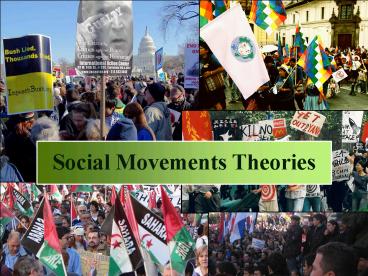Theories of Social Movements - PowerPoint PPT Presentation
1 / 12
Title:
Theories of Social Movements
Description:
A 'kind of group' groups' that are large enough to continue their existence even ... Della Porta, Donatello and Diani Mario. Social Movements: An Introduction. ... – PowerPoint PPT presentation
Number of Views:1413
Avg rating:3.0/5.0
Title: Theories of Social Movements
1
Social Movements Theories
2
On Collective Behavior
- an extrainstitutional group-problem-solving
behaviour that encompasses an array of collective
actions, ranging from protest demonstrations, to
behaviour in disasters, to mass or diffuse
phenomena such as fads and crazes, to social
movements and revolutions. - Social Movements as a variant of Collective
Behaviour, which differs greatly from other
forms.
3
An Array of Definitions
- Social Movements as collective challenges by
people with common purposes and solidarity in
sustained interaction with elites, opponents and
authorities (Tarrow, 1994). - A kind of group groups that are large enough
to continue their existence even if there should
be a change in the composition of the membership.
- a series of contentious performances, displays
and campaigns by which ordinary people make
collective claims on others (Tilly, 2004)
4
Social Movement Characteristics
- Four characteristics that define social movements
that scholars from varying theoretical
backgrounds agree upon - 1. Informal interaction networks between a
plurality of individuals, - groups and/or organizations
- 2. Shared beliefs and solidarity
- 3. Collective action focusing on political and/or
cultural conflicts - 4. Use of protest
- - Not to be confused with interest groups,
pressure groups, individual organizations or
political parties. (Della Porta 1999 , Heberle,
1951)
5
Stages of Social Movement
- Social movements are cyclical in nature whether
or not they have achieved their cause, they tend
to dissolve and perhaps emerge again under new
leadership or different sociopolitical
circumstances.
6
Theories of Social Movement
- These theories must be seen as approaches, rather
than schools of thought. - The theories are not mutually exclusive but
often overlapping. - Political Opportunity Theory
- Resource Mobilization Theory
- New Social Movement Theory
- ? The role of identity in collective actions
7
Political Opportunity Theory
- A set of formal and informal political
conditions that may encourage, discourage,
channel or affect movement activity - Units of analysis
- - degree of openness of political institutions
to challengers of status quo - - degree to which movements have allies within
political elite- degree to which political
authorities are willing to use repression towards
challengers
8
Resource Mobilization Theory
- The actors act in a rational way, evaluating
costs and benefits, under the influence of the
presence of ressources. - Movements are part of the normal political
process. - It focuses on the measurable impacts of movements
on political issues and does not emphasise the
expressive, ideological, identity-shaping aspects
of social movements.
9
New Social Movement Theory
- Developed in Europe as a means to explain the
Social Movements in the 60s and 70s (feminism,
environmental and peace issues etc.). - Emphasis on- cultural nature of social
movements- group or collective identity - - values and lifestyles
- All these in addition to developed ideologies.
- characterized by an open, fluid organisation and
greater attention to social than to economic
transformations.
10
Identity in Social Movement
- Identity the process by which social actors
recognize themselves and are recognized by
others actors as part of broader groupings (D.
Della Porta, 1999). - The construction of identity as both a
psychological and a social process. - Action constitutes identity
- Identity as a social process
11
Identity in Social Movement
- Identity as a rational action the criticism of
Mancur Olsons theory (1963) - ? it is impossible to determine the costs and
benefits appropriately - ? the existence of a collective identity must
be taken into account - System of interdependance within
- The other actors
- Social movements often create the
- goods concerning which they mobilize
12
Bibliography Davis F. Gerald et. al. Social
Movement and Organization Theory. New York
Cambridge University Press 2006.Della Porta,
Donatello and Diani Mario. Social Movements An
Introduction. Massachussetts Blackwell Publishers
Ltd. 2000. Heberle, Rudolf. Social Movements
An Introduction to Political Sociology. New York
Appelton Century Crofts, Inc. 1951.































